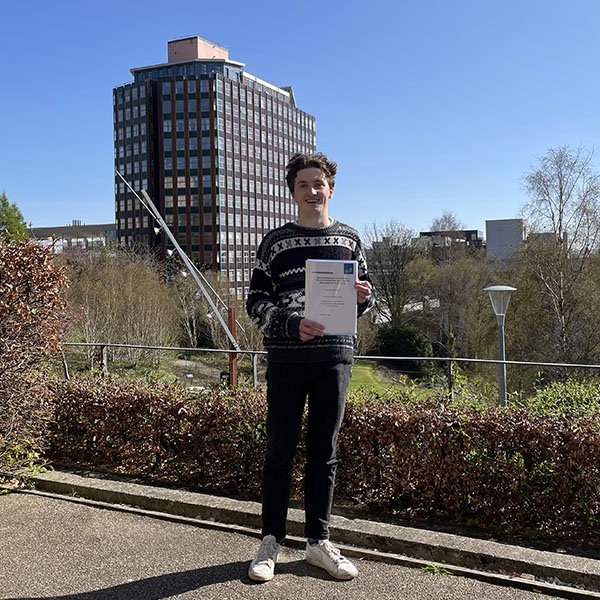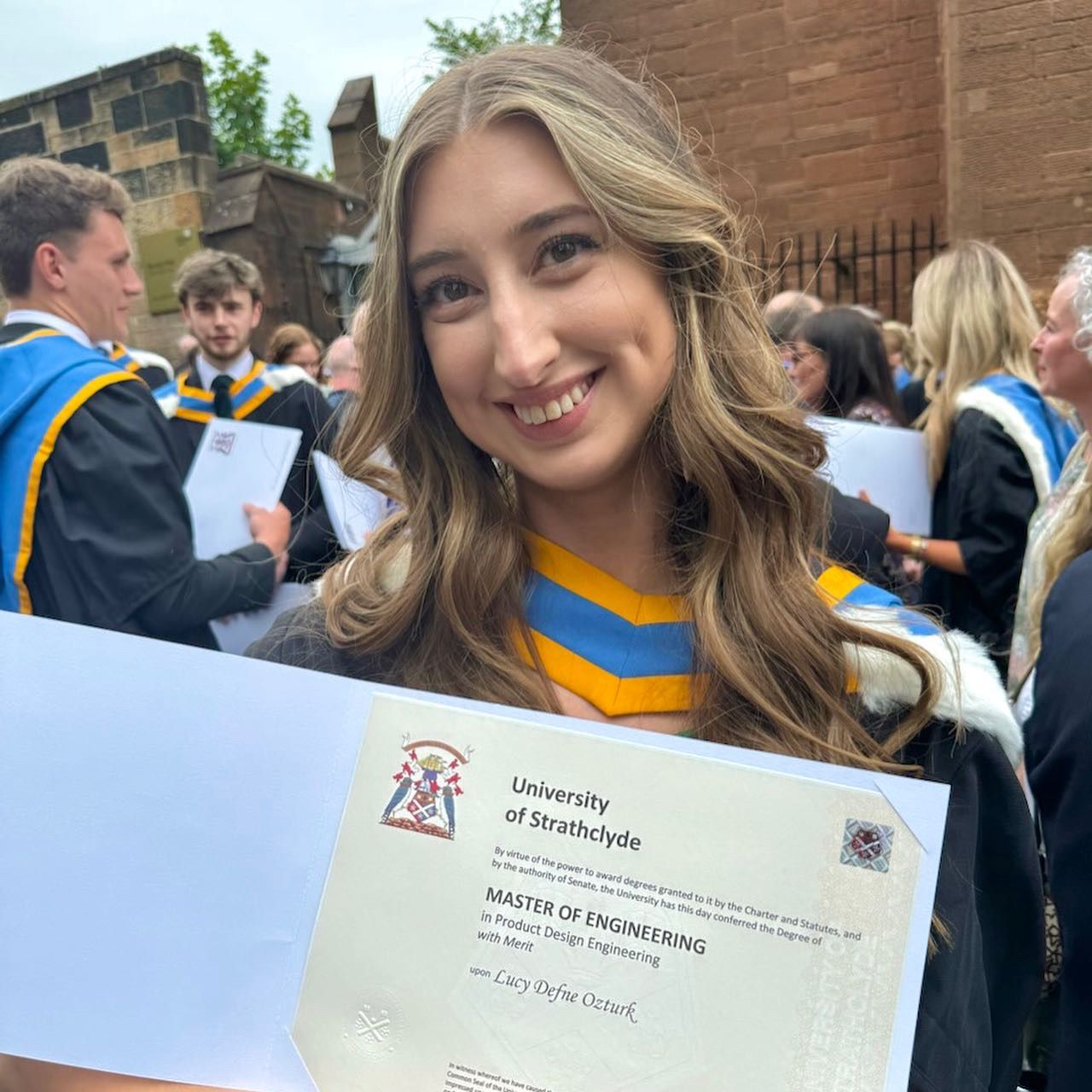Engineering Academy
ApplyKey facts
- UCAS Code: 0BRT
Become a registered Strathclyde student
Ranked Number 6 in the UK (and Number 1 in Scotland) for Electronic and Electrical Engineering by The Times/ Sunday Times Good University Guide 2026
Options for paid summer placements
Study with us
- provides a supportive transition to university study
- choose from three separate HNC programmes
- take an enhanced HNC programme in your first year at one of our partner colleges
- guaranteed progression into second year of selected programmes upon satisfactory performance
- access to Engineering Academy Scholarships
The Place of Useful Learning
UK University of the Year
Daily Mail University of the Year Awards 2026
Scottish University of the Year
The Sunday Times' Good University Guide 2026
Why this course?
The Engineering Academy is a unique access route into university and employment. It is a collaboration between the University of Strathclyde, partner colleges and industry which will deliver a pathway to a range of engineering degrees in the University's leading Faculty of Engineering.
As a student in the Engineering Academy, you will be a registered student of the University of Strathclyde with access to all of the facilities. In year one, you will study an enhanced HNC qualification with one of our partner colleges and also attend the University of Strathclyde to develop your academic and practical engineering skills. In subsequent years, the Engineering Academy offers opportunities for paid summer work placements with our industry partners.
As part of the University’s outreach objective, the Academy was established to increase widening access participation by delivering various pathways to a range of engineering degrees in our leading Faculty of Engineering.


How the Academy works?
Your first year is taken as an enhanced HNC programme at one of the partner colleges, together with practical skills units and departmental activities which take place at Strathclyde. Students who complete the enhanced HNC award, gain an A in the Graded Unit and engage with Strathclyde activities are guaranteed direct progression into one of our undergraduate degree programmes:
- HNC Chemical Engineering allows you to progress to Year 2 of the BEng Hons Chemical Engineering degree
- HNC Electronics allows you to progress to Year 2 of the BEng Hons Electronic & Electrical Engineering degree
- HNC General Engineering allows you to progress to Year 1 of the BEng Hons Biomedical Engineering degree and Year 2 of the following degrees:
- BEng Hons Civil Engineering
- BEng Hons Civil and Environmental Engineering
- BEng Hons Product Design Engineering
- BEng Hons Manufacturing Engineering with Management
- BEng Hons Sports Design Engineering
- BSc Hons Product Design and Innovation
- BEng Hons Mechanical Engineering
- BEng Hons Naval Architecture and Marine Engineering
- BEng Hons Naval Architecture with High Performance Marine Vehicles
- BEng Hons Naval Architecture with Ocean Engineering
For the Electronics and General Engineering programmes, you'll also attend the University of Strathclyde in year one to undertake a practical engineering skills qualification.
Partner colleges
We currently work in partnership with seven colleges:
- Ayrshire College - Kilmarnock Campus
- City of Glasgow College
- Forth Valley College
- Glasgow Clyde College - Cardonald Campus
- Glasgow Kelvin College - Springburn Campus
- New College Lanarkshire
- West College Scotland - Paisley Campus
The course you're planning to study at Strathclyde will determine what college partners you're able to study at in your first year.
Industry sponsorship & placements
A wide range of employers across Scotland and further afield have partnered with the Engineering Academy to provide sponsorships and summer work placements. This will allow you to put the theory you learn into practice and get hands-on industrial experience.
The placements take place during the summer break between Years 2 and 3 and 3 and 4. The continuous contact with your sponsor company ensures you have an enhanced CV, giving you an extra edge in today’s competitive job market.
Our students

Grace Sherry
Over the last couple of summers, I worked as a data engineer in a racing team competing in the British Touring Car Championship. I got to travel around to different circuits all over the UK

Alex Paterson
I completed a three-month summer placement in a precision manufacturing firm. I gained experience working in the quality assurance, design, and engineering teams, and was given the responsibility to implement my own design for a training bay for the welding department.

Charles Bell Reilly
I can say with certainty that my year in college was excellent preparation for joining the mainstream students in second year.

Lucy Ozturk
I have taken full advantage of everything the university has to offer. From studying abroad at DTU in Copenhagen, to interning in the USA, I could never have imagined the things I would achieve.
Key benefits
As an Engineering Academy student you'll:
- be a registered student of the University of Strathclyde while you're completing year 1 in college
- become familiar with University life
- have access to an academic counsellor at Strathclyde
- have electronic access to the University's Virtual Learning Environment
- be given your own Strathclyde email address and login
- be able to join Strathclyde Sport
- have full access to the University Library
- gain student membership of the University of Strathclyde Students' Union
- be eligible to apply for accommodation on the University of Strathclyde campus
In addition, you'll have opportunities to apply for:
- financial support from year 2 onwards via company sponsorships
- specific mentoring and professional development with a sponsoring company
- paid summer placements, allowing you to put your theory into practice, between year 2 and 3, and year 3 and 4
Entry requirements
Required subjects are shown in brackets.
| Highers | Standard entry requirements*:
(Including Maths and Physics/ Engineering Science at B. For entry to Chemical Engineering, Higher Physics is not required but Higher Maths and Higher Chemistry at B are required, and for entry to Biomedical Engineering, Higher Biology or Human Biology at B is also required.) Minimum entry requirements**:
(Including Maths and Physics/ Engineering Science at B. For entry to Chemical Engineering, Higher Physics is not required but Higher Maths and Higher Chemistry at B are required, and for entry to Biomedical Engineering, Higher Biology or Human Biology at B is also required.) |
|---|---|
| English language requirements | If English is not your first language, please visit our English language requirements page for full details of the requirements in place before making your application. |
Additional information
- Deferred entry is accepted
- Access qualifications are also considered
- SQA Higher Applications of Mathematics is not accepted instead of Higher Mathematics
- Foundation Apprenticeship will be accepted as one of the non-mandatory Highers
Frequently asked questions
What are the minimum entry requirements?
We typically ask for two Highers at Grade B and two at Grade C and these must include Maths and Physics/Engineering Science at B. For entry to Chemical Engineering, Higher Physics is not required but Higher Maths and Higher Chemistry at B are required, and for entry to Biomedical Engineering, Higher Biology or Human Biology at B is also required.
*Standard entry requirements
Offers are made in accordance with specified entry requirements although admission to undergraduate programmes is considered on a competitive basis and entry requirements stated are normally the minimum level required for entry.
Whilst offers are made primarily on the basis of an applicant meeting or exceeding the stated entry criteria, admission to the University is granted on the basis of merit, and the potential to succeed. As such, a range of information is considered in determining suitability.
In exceptional cases, where an applicant does not meet the competitive entry standard, evidence may be sought in the personal statement or reference to account for performance which was affected by exceptional circumstances, and which in the view of the judgement of the selector would give confidence that the applicant is capable of completing the programme of study successfully.
**Minimum entry requirements
Glasgow is Scotland's biggest & most cosmopolitan city
Our campus is based right in the very heart of Glasgow. We're in the city centre, next to the Merchant City, both of which are great locations for sightseeing, shopping and socialising alongside your studies.
Fees & funding
Fees may be subject to updates to maintain accuracy. Tuition fees will be notified in your offer letter.
All fees are in £ sterling, unless otherwise stated, and may be subject to revision.
Annual revision of fees
Students on programmes of study of more than one year (or studying standalone modules) should be aware that the majority of fees will increase annually.
The University will take a range of factors into account, including, but not limited to, UK inflation, changes in delivery costs and changes in Scottish and/or UK Government funding. Changes in fees will be published on the University website in October each year for the following year of study and any annual increase will be capped at a maximum of 10% per year. This cap will apply to fees from 2026/27 onwards, which will not increase by more than 10% from the previous year for continuing students.
| Scotland | To be confirmed. Fees for students domiciled in Scotland are subject to confirmation by the Scottish Funding Council. Scottish undergraduate students undertaking an exchange for a semester/year will continue to pay their normal tuition fees at Strathclyde and will not be charged fees by the overseas institution. |
|---|---|
| Available scholarships | We have a wide range of scholarships available. Have a look at our scholarship search to find a scholarship. |
| Additional costs | Course materials & costsThe department provides a service whereby printed notes are available to the students subject to a small charge to cover copying costs. Students are recommended/required to have copies of such notes but we provide access to both printed copies and e-copies. The latter are provided without charge – in accordance with University policy. Any printed material that is mandatory (in that form) is provided without additional charge to the students. Placements & field tripsThe department and student societies support a number of industrial visits throughout the year. These trips are not mandatory for specific programmes and modules and any incurred charge to cover transport is either met by the students or by the department. Study abroadStudy abroad is possible in Years 3 to 5 but is only compulsory (in year 4) for the "with International Study" degree programmes. Students will bear some of the cost of this which will vary depending on country of study. (Support from SAAS and Erasmus may be available). Other costsStudents are not required to purchase any specific software licenses – all software used is available on campus machines, either locally or remotely. All undergraduates and PGI students are provided for the duration of their course with student-membership of IET (Professional Body) paid for by the department. Some hardware (micro controllers, design boards) may be made available to students for loan subject to appropriate refundable deposit. Students may consider purchase of low cost microcontroller boards for 3rd year and beyond project work - cost from £10 to £30. Access to EEE Computer labs out of working hours is via card access - card cost is £20 - refundable on return of card. Students are provided with an additional print-quota for use in EEE labs for EEE classes conducted in EEE computer labs. (Paid top-ups possible via University IT services). Expected printing and report binding costs are around £15 to £20 a year - will depend upon exact programme and class assignments. Binding is provided at cost (50p to £1.00) by EEE Resource Centre in R4.01. |
Find out more about applying
Applying for the Engineering Academy couldn't be easier. Read our frequently asked questions to find out more.
How can I fund my studies?
Students from Scotland
Fees for students who meet the relevant residence requirements in Scotland, you may be able to apply to the Student Award Agency Scotland (SAAS) to have your tuition fees paid by the Scottish government. Scottish students may also be eligible for a bursary and loan to help cover living costs while at University.
For more information on funding your studies have a look at our University Funding page.
Careers
Engineering Academy graduates have gone on to a wide variety of roles including:
- Product Management Executive
- Global Supply Chain Engineer
- Offshore Project Engineer
- Graduate Scheme Engineer
- Design Engineer business owner
- PhD study
Apply
Start date: Aug 2026
Engineering Academy

